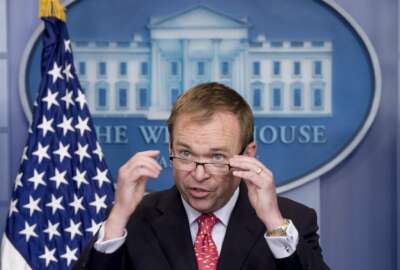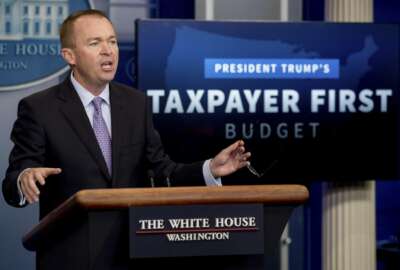
3 things you missed in the president’s 2018 budget request
Among the major items in the President's 2018 budget request are a few other provisions that have the potential to impact federal employees and their agencies.
The president’s 2018 budget request is packed with agency reforms and tidbits, that on first glance, federal employees may not immediately notice.
Among them are proposals to eliminate more than 60 agency programs over time, changes to federal retirement and more funding for several IT programs.
Here are three more items from President Donald Trump’s request that may impact you or your agency if they’re included in a final budget agreement in 2018.
Public Service Loan Forgiveness
In his 2018 request, the president proposed a significant change to multiple student loan programs, including the Public Service Loan Forgiveness (PSLF) program.
Individuals employed in government or non-profit organizations can apply to the PSLF program, which forgives the remaining balance on their loans after they’ve made a certain number of payments.
There are some exceptions, but the program was generally designed to incentivize college graduates to pursue careers in the federal government.
The president’s budget suggests eliminating PSLF in order to support a new package of targeted student loan reforms.
“PSLF unfairly favors some career choices over others and is complicated for borrowers to navigate,” budget documents said. “This package would simplify repayment for all new undergraduate borrowers regardless of occupation and create a pathway for expedited debt forgiveness after 15 years of payments instead of after 20 years under current law.”
The National Treasury Employees Union said it opposed the administration’s proposal to eliminate the program, adding that the argument for dropping PSLF showed that the Education Department misunderstood the program’s intent.
“It makes possible a career helping others, a career based in public service, a career that would not be possible for lower and moderate income students,” NTEU National President Tony Reardon wrote in a May 25 letter to Education Secretary Betsy DeVos. “In our union, we have many lawyers and scientists who could make two or three times more money working in the private sector. But they believe that being a civil servant is a calling, and they feel fortunate to be able to work in the government with lower pay, knowing that, at some point in the future, their student loans will be paid off.”
NTEU also disagreed with the administration’s argument that the program is too difficult for participants to navigate and encouraged the Education Department to offer better training for its loan servicers.
An EEOC merger
President Trump also proposed merging the Labor Department’s Office of Federal Contract Compliance Programs (OFCCP) with the Equal Employment Opportunity Commission, subsequently creating one agency to “combat employment discrimination,” the budget said.
Both organizations should work together to finish this transition by the end of fiscal 2018.
“This builds on the existing tradition of operational coordination between the two agencies,” document said. “The transition of OFCCP and integration of these two agencies will reduce operational redundancies, promote efficiencies, improve services to citizens and strengthen civil rights enforcement.”
A House Education and Workforce subcommittee recently criticized EEOC and its backlog of unsettled claims at a hearing earlier this week.
Building closures
The president’s budget also completely cuts funding for the National Biodefense Analysis and Countermeasures Center in Frederick, Maryland.
The center is part of the Homeland Security Department and helps the department defend against biological threats. DHS created the national laboratory after a series of anthrax attacks in 2001.
“I am concerned that this is part of an ill-advised agenda by the Trump administration to reduce investments in actually effective and important parts of our security portfolio in order to pursue a political agenda,” Rep. John Delaney (D-Md.) said in a statement. “This looks like they’re cutting everything they can find to pay for a wall along the Mexican border.”
The center has about 150 employees, according to DHS.
The president’s budget does, however, include $85 million in funding for DHS to continue consolidating and moving component agencies to St. Elizabeths in Washington.
Copyright © 2025 Federal News Network. All rights reserved. This website is not intended for users located within the European Economic Area.
Nicole Ogrysko is a reporter for Federal News Network focusing on the federal workforce and federal pay and benefits.
Follow @nogryskoWFED




